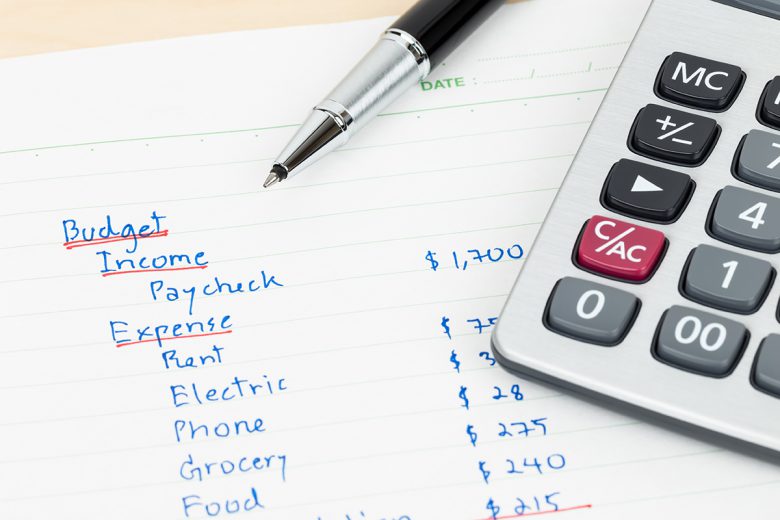Have your needs, goals, earnings, or expenses changed since you first created your budget? Or is your budget just not working as well for you as it did previously? If so, you may need to evaluate your income and budget. Doing so will ensure your current financial needs and goals are met and that you don’t spend more than you earn. With this in mind, read on for tips on how to assess your income and budget.
The basics of financial responsibility
Financial responsibility involves living within your means and saving money, meaning you should spend less than you earn and save money. Here are some ways to be financially responsible:
- Credit cards – Pay the balance on your account in full each month, and curb your spending until that balance is paid off. Even better, use cash instead of a credit card.
- Interest payments – Avoid paying interest on anything so you don’t spend more than the purchase price. For a home loan, increase your monthly repayments to reduce the interest you pay in the long-term.
- Needs vs wants – You might need a car and a house, but you don’t need a luxury car or mansion – only buy a car or house that won’t break the bank.
- Saving – If you plan to retire, try to save 10% of each pay cheque before paying your bills.
- Emergency fund – Build an emergency fund that’s worth at least six months of living expenses for a rainy day.
- Family comes first – Take care of your family’s needs, and don’t let others’ spending habits dictate yours.
- Budgeting – Create a budget so you know where your money’s going and where you can save.
Why look at your financial health
Your finances can make or break you, so knowing your financial position is important. If you’re planning on buying a new car or home, or if there are significant changes in your earnings or expenses, you need should evaluate your income and budget. By doing an income and budget assessment, you’ll be able to determine what adjustments you need to make financially so you can meet your current financial goals and enjoy a financially stress-free life.
How to evaluate your income and budget
1. Determine your net worth
Your net worth is the money you have left over after taxes and payments have been deducted from your pay cheque. Look at your payslips and bank statements to determine your average monthly net worth. You should include all your present sources of income, such as your annual salary, partner’s salary, bonuses, interest, investments, child support, side jobs, and so on. The amount left over tells you how much you can afford to save and use to pay for expenses. You can track your net worth using free online tools like Mint and Personal Capital.
2. Estimate your expenses
When estimating your expenses, you should include rent or mortgage, food, utilities, transportation, clothing, medical, entertainment, insurance, deductions for savings or investments, and so on. You can consider dividing your expenses into fixed expenses (for example, rent or mortgage), variable expenses (for example, food), and optional expenses (for example, entertainment). Look at your receipts and bank statements to determine how much you currently spend each month.
3. Compare your income and expenses
The next thing to do is compare your income and expenses. Do this by subtracting total monthly expenses total from your total monthly income. If you get a positive number, it means you’re spending less than you earn and don’t have to worry about going into debt. But if you get a negative number, this means your expenses are greater than you can afford and you’ll need to reduce them to start living within your means.
4. Write down your current financial goals
Writing down your current financial goals can help you to continue or begin living within your means, and you’ll also have a much higher chance of success in achieving them. You should identify what you want to achieve in both the short and long-term, such as getting out of debt, buying a new house, starting a family, or retiring. If your evaluation shows you’re spending more than you earn, then create new goals to determine what expenses to cut back on, how to increase your income, and how much money you should save.
5. Rethink your spending habits
Now that you’ve re-evaluated your financial goals, you can rethink your spending habits. For example, you could:
- Cancel subscriptions to gyms, magazines, and online video streaming services.
- Sell a car if you work at home and your partner works close by.
- Sell items you don’t need.
- Choose a cheaper mobile phone plan.
- Live in a smaller home to save on rent or mortgage, utilities, and maintenance costs.
- Move closer to work to save on transportation costs.
- Buy used items.
- Eat at home instead of eating out.
- Take advantage of free offers, coupons, cash backs, rewards programs, and deal sites like Groupon.
6. Reconsider your savings, debts and investments
If you find you’re not saving enough for your financial goals, then you need to evaluate and change your savings habits. For example, if you want to retire early, put more money into your super or get a side job to increase your income. You can also set up automatic bank payments, where a certain amount of your income goes into a high-interest savings account.
If you’re paying off a mortgage, student loan or credit card debt, you should evaluate how to most effectively pay them. You should also consider whether the interest rates on your debt can be reduced.
As for your investments, determine whether you need to rebalance your portfolio based on your current risk tolerance or investment goals, or whether you can reduce your investment costs by switching mutual funds, investment advisors, or both.
Need a personal loan for a cash shortfall?
Regularly evaluating your income and budget will tell you whether or not you currently earn enough to pay for your expenses and save money at the same time. If not, you’ll need to find ways to increase your income and reduce your expenses.
You can consider applying for a loan if you don’t have enough cash on hand to pay off a bill or credit card payment. SRG Finance specialises in same-day cash loans and we can give you a personal loan to help you cover your cash shortfalls.



